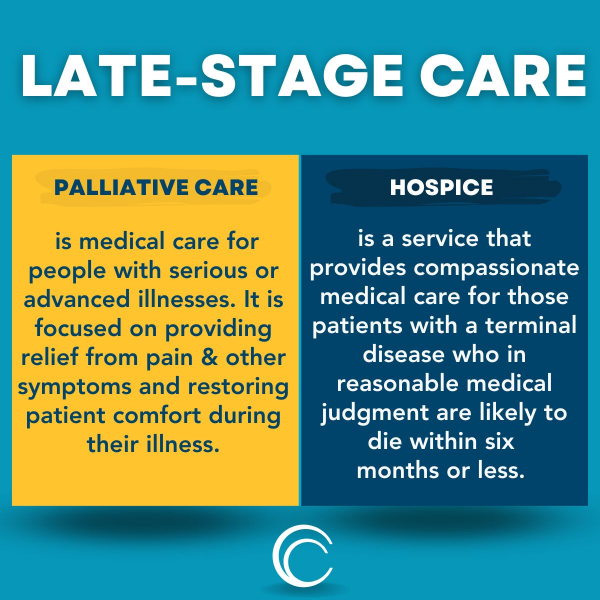Compassion & Choices is working to raise awareness about and improve access to palliative care through public education and federal policy change.
Why Does Compassion & Choices Support Palliative Care?
The goal of palliative care is to relieve suffering and provide the best possible quality of life for patients and their families at any time during the progression of a serious disease.
While palliative care may happen long before somebody is going to die, it can help result in a better death because palliative care specialists:
- help patients and their families to determine appropriate medical care and understand the benefits and burdens of treatment options.
- align the patient's care goals with those of the healthcare team.
- establish the need for a medical proxy, advance directive, and resuscitation status.
Since palliative care is taking place in tandem with curative treatment it is often easier for providers to build trust with patients.
What is palliative care?
Palliative care focuses on pain and symptom management for people living with serious illness as well as coordination of care and quality of life.Who provides palliative care?
Palliative care uses an interdisciplinary team approach that may include palliative care specialist doctors and nurses, social workers, nutritionists, chaplains, and even family members — depending on the person’s needs. Palliative care is performed in collaboration with the patient’s primary care physician and specialists.
Who can benefit from palliative care?
Palliative care is a resource for anyone living with a serious illness, such as cancer, dementia, heart failure or many others. Palliative care is available starting at the onset of a serious diagnosis. However, it can be beneficial at any stage of a disease.
Where can you get palliative care?
Palliative care is provided in a range of health care settings, including:
- Home
- Hospice facility
- Skilled nursing facility
- Long-term care facility/nursing home
- Long-term acute care facility/nursing home
- Assisted living facility
- Hospital
- Group home
- Clinics
How do I access palliative care?
To begin palliative care, a person's health care provider may refer him or her to a palliative care specialist. If the doctor does not suggest palliative care, a patient can ask for a referral.
Will insurance pay for it?
Medicare part B, Medicaid, the Department of Veterans Affairs and many health insurance providers cover some palliative care services. Contact your health insurance provider to find out what coverage is available to you.
Is there a limit on how long I can use palliative care?
Palliative care is not time limited. How long an individual can receive care will depend upon their care needs, and the coverage they have through Medicare, Medicaid, or private insurance.
How is palliative care different from hospice care?

Palliative care is available to patients at the onset of a serious diagnosis. It is not time limited, and a patient can continue to receive curative treatments while receiving palliative care.
Hospice care is only available to a patient who has a prognosis of six months or less to live. It is designed to help patients who are going to die have the best death possible. In most instances, a patient must be at the point of forgoing curative treatments to access hospice care. Hospice includes many of the same services that a person can get through palliative care. However, a patient may have more services available through hospice care such as 24-hour on-call service, medical equipment, and respite care.


